Business Ethics Report: Business Ethics, CSR, and Stakeholders
VerifiedAdded on 2023/01/23
|20
|6128
|33
Report
AI Summary
This report delves into the intricate relationship between business and society, emphasizing the evolving dynamics influenced by macro-environmental forces. It examines the significance of stakeholders in business operations, highlighting potential conflicts and the necessity for inclusive decision-making. The report further explores the interplay between business ethics and corporate social responsibility (CSR), differentiating their meanings while acknowledging their interconnectedness. It analyzes the economic, political, and social forces that shape CSR, emphasizing the responsibilities of corporations towards customers, employees, and the community. The report also reflects on the author's evolving understanding of workplace ethics and CSR, emphasizing the importance of ethical considerations in navigating environmental changes and fostering sustainable business practices. It underscores the significance of ethical behavior in building strong stakeholder relationships and ensuring the long-term success of the organization.

Running head: BUSINESS ETHICS
BUSINESS ETHICS
Name of the Student:
Name of the University:
Author Note:
BUSINESS ETHICS
Name of the Student:
Name of the University:
Author Note:
Paraphrase This Document
Need a fresh take? Get an instant paraphrase of this document with our AI Paraphraser
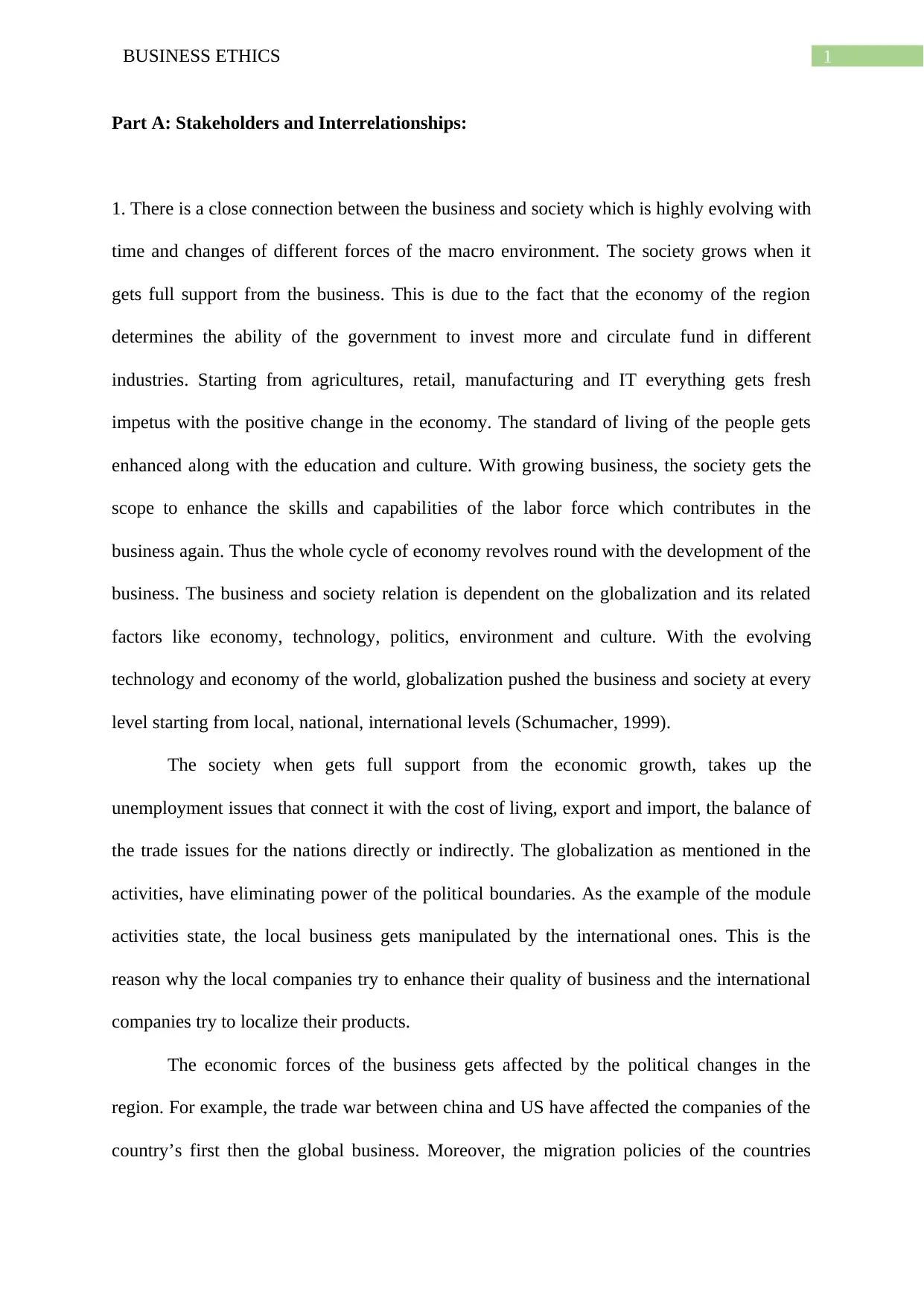
1BUSINESS ETHICS
Part A: Stakeholders and Interrelationships:
1. There is a close connection between the business and society which is highly evolving with
time and changes of different forces of the macro environment. The society grows when it
gets full support from the business. This is due to the fact that the economy of the region
determines the ability of the government to invest more and circulate fund in different
industries. Starting from agricultures, retail, manufacturing and IT everything gets fresh
impetus with the positive change in the economy. The standard of living of the people gets
enhanced along with the education and culture. With growing business, the society gets the
scope to enhance the skills and capabilities of the labor force which contributes in the
business again. Thus the whole cycle of economy revolves round with the development of the
business. The business and society relation is dependent on the globalization and its related
factors like economy, technology, politics, environment and culture. With the evolving
technology and economy of the world, globalization pushed the business and society at every
level starting from local, national, international levels (Schumacher, 1999).
The society when gets full support from the economic growth, takes up the
unemployment issues that connect it with the cost of living, export and import, the balance of
the trade issues for the nations directly or indirectly. The globalization as mentioned in the
activities, have eliminating power of the political boundaries. As the example of the module
activities state, the local business gets manipulated by the international ones. This is the
reason why the local companies try to enhance their quality of business and the international
companies try to localize their products.
The economic forces of the business gets affected by the political changes in the
region. For example, the trade war between china and US have affected the companies of the
country’s first then the global business. Moreover, the migration policies of the countries
Part A: Stakeholders and Interrelationships:
1. There is a close connection between the business and society which is highly evolving with
time and changes of different forces of the macro environment. The society grows when it
gets full support from the business. This is due to the fact that the economy of the region
determines the ability of the government to invest more and circulate fund in different
industries. Starting from agricultures, retail, manufacturing and IT everything gets fresh
impetus with the positive change in the economy. The standard of living of the people gets
enhanced along with the education and culture. With growing business, the society gets the
scope to enhance the skills and capabilities of the labor force which contributes in the
business again. Thus the whole cycle of economy revolves round with the development of the
business. The business and society relation is dependent on the globalization and its related
factors like economy, technology, politics, environment and culture. With the evolving
technology and economy of the world, globalization pushed the business and society at every
level starting from local, national, international levels (Schumacher, 1999).
The society when gets full support from the economic growth, takes up the
unemployment issues that connect it with the cost of living, export and import, the balance of
the trade issues for the nations directly or indirectly. The globalization as mentioned in the
activities, have eliminating power of the political boundaries. As the example of the module
activities state, the local business gets manipulated by the international ones. This is the
reason why the local companies try to enhance their quality of business and the international
companies try to localize their products.
The economic forces of the business gets affected by the political changes in the
region. For example, the trade war between china and US have affected the companies of the
country’s first then the global business. Moreover, the migration policies of the countries
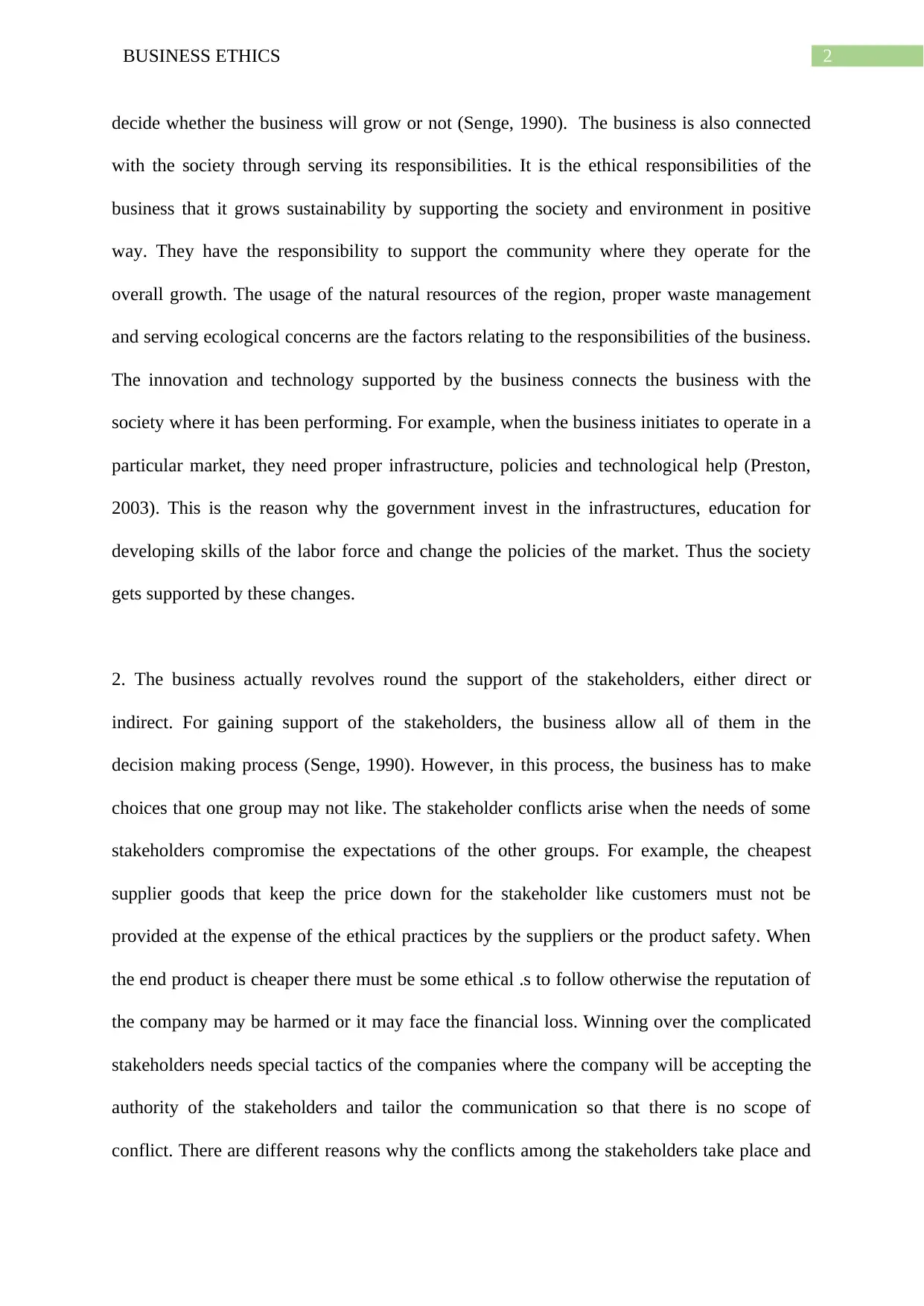
2BUSINESS ETHICS
decide whether the business will grow or not (Senge, 1990). The business is also connected
with the society through serving its responsibilities. It is the ethical responsibilities of the
business that it grows sustainability by supporting the society and environment in positive
way. They have the responsibility to support the community where they operate for the
overall growth. The usage of the natural resources of the region, proper waste management
and serving ecological concerns are the factors relating to the responsibilities of the business.
The innovation and technology supported by the business connects the business with the
society where it has been performing. For example, when the business initiates to operate in a
particular market, they need proper infrastructure, policies and technological help (Preston,
2003). This is the reason why the government invest in the infrastructures, education for
developing skills of the labor force and change the policies of the market. Thus the society
gets supported by these changes.
2. The business actually revolves round the support of the stakeholders, either direct or
indirect. For gaining support of the stakeholders, the business allow all of them in the
decision making process (Senge, 1990). However, in this process, the business has to make
choices that one group may not like. The stakeholder conflicts arise when the needs of some
stakeholders compromise the expectations of the other groups. For example, the cheapest
supplier goods that keep the price down for the stakeholder like customers must not be
provided at the expense of the ethical practices by the suppliers or the product safety. When
the end product is cheaper there must be some ethical .s to follow otherwise the reputation of
the company may be harmed or it may face the financial loss. Winning over the complicated
stakeholders needs special tactics of the companies where the company will be accepting the
authority of the stakeholders and tailor the communication so that there is no scope of
conflict. There are different reasons why the conflicts among the stakeholders take place and
decide whether the business will grow or not (Senge, 1990). The business is also connected
with the society through serving its responsibilities. It is the ethical responsibilities of the
business that it grows sustainability by supporting the society and environment in positive
way. They have the responsibility to support the community where they operate for the
overall growth. The usage of the natural resources of the region, proper waste management
and serving ecological concerns are the factors relating to the responsibilities of the business.
The innovation and technology supported by the business connects the business with the
society where it has been performing. For example, when the business initiates to operate in a
particular market, they need proper infrastructure, policies and technological help (Preston,
2003). This is the reason why the government invest in the infrastructures, education for
developing skills of the labor force and change the policies of the market. Thus the society
gets supported by these changes.
2. The business actually revolves round the support of the stakeholders, either direct or
indirect. For gaining support of the stakeholders, the business allow all of them in the
decision making process (Senge, 1990). However, in this process, the business has to make
choices that one group may not like. The stakeholder conflicts arise when the needs of some
stakeholders compromise the expectations of the other groups. For example, the cheapest
supplier goods that keep the price down for the stakeholder like customers must not be
provided at the expense of the ethical practices by the suppliers or the product safety. When
the end product is cheaper there must be some ethical .s to follow otherwise the reputation of
the company may be harmed or it may face the financial loss. Winning over the complicated
stakeholders needs special tactics of the companies where the company will be accepting the
authority of the stakeholders and tailor the communication so that there is no scope of
conflict. There are different reasons why the conflicts among the stakeholders take place and
⊘ This is a preview!⊘
Do you want full access?
Subscribe today to unlock all pages.

Trusted by 1+ million students worldwide
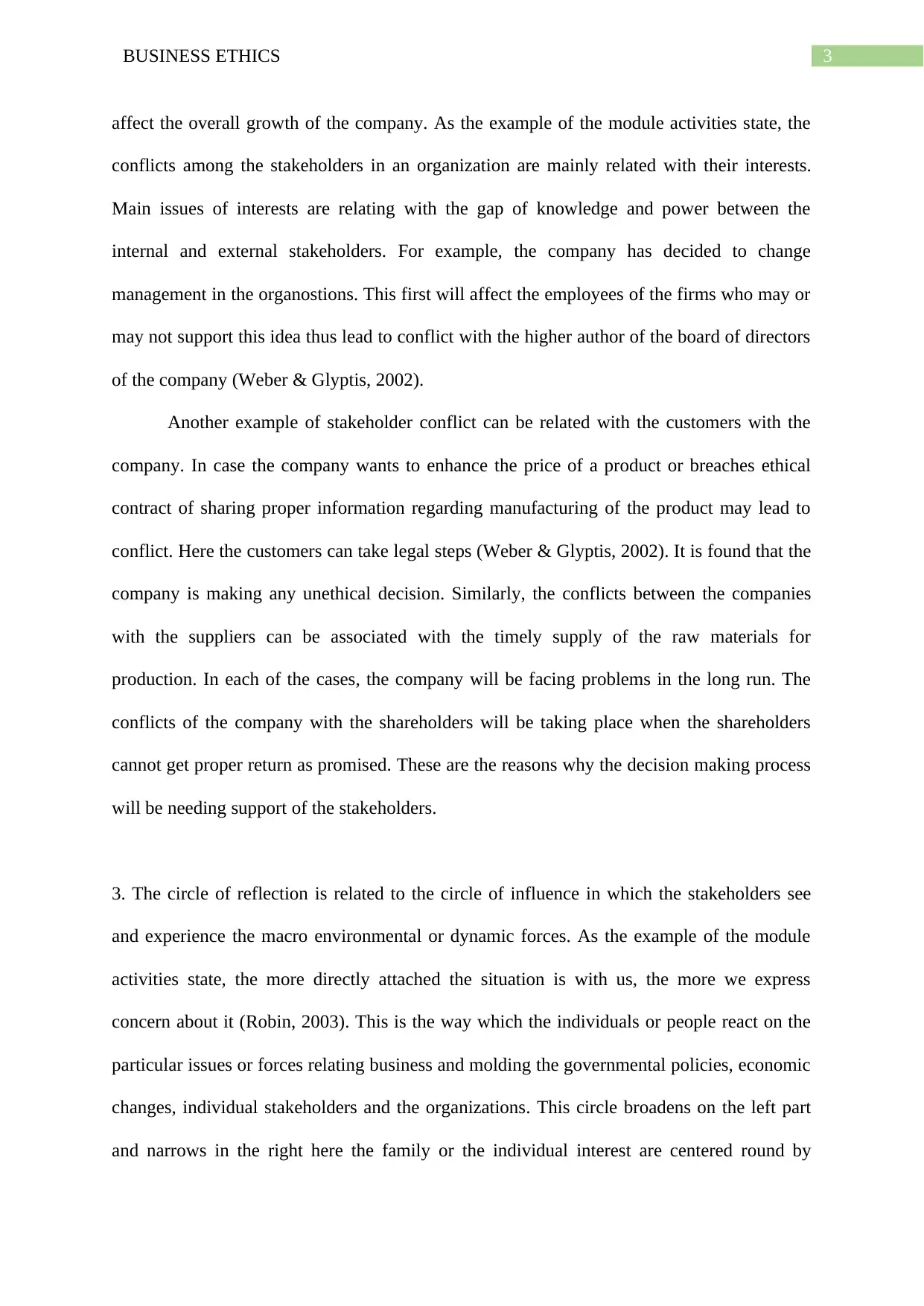
3BUSINESS ETHICS
affect the overall growth of the company. As the example of the module activities state, the
conflicts among the stakeholders in an organization are mainly related with their interests.
Main issues of interests are relating with the gap of knowledge and power between the
internal and external stakeholders. For example, the company has decided to change
management in the organostions. This first will affect the employees of the firms who may or
may not support this idea thus lead to conflict with the higher author of the board of directors
of the company (Weber & Glyptis, 2002).
Another example of stakeholder conflict can be related with the customers with the
company. In case the company wants to enhance the price of a product or breaches ethical
contract of sharing proper information regarding manufacturing of the product may lead to
conflict. Here the customers can take legal steps (Weber & Glyptis, 2002). It is found that the
company is making any unethical decision. Similarly, the conflicts between the companies
with the suppliers can be associated with the timely supply of the raw materials for
production. In each of the cases, the company will be facing problems in the long run. The
conflicts of the company with the shareholders will be taking place when the shareholders
cannot get proper return as promised. These are the reasons why the decision making process
will be needing support of the stakeholders.
3. The circle of reflection is related to the circle of influence in which the stakeholders see
and experience the macro environmental or dynamic forces. As the example of the module
activities state, the more directly attached the situation is with us, the more we express
concern about it (Robin, 2003). This is the way which the individuals or people react on the
particular issues or forces relating business and molding the governmental policies, economic
changes, individual stakeholders and the organizations. This circle broadens on the left part
and narrows in the right here the family or the individual interest are centered round by
affect the overall growth of the company. As the example of the module activities state, the
conflicts among the stakeholders in an organization are mainly related with their interests.
Main issues of interests are relating with the gap of knowledge and power between the
internal and external stakeholders. For example, the company has decided to change
management in the organostions. This first will affect the employees of the firms who may or
may not support this idea thus lead to conflict with the higher author of the board of directors
of the company (Weber & Glyptis, 2002).
Another example of stakeholder conflict can be related with the customers with the
company. In case the company wants to enhance the price of a product or breaches ethical
contract of sharing proper information regarding manufacturing of the product may lead to
conflict. Here the customers can take legal steps (Weber & Glyptis, 2002). It is found that the
company is making any unethical decision. Similarly, the conflicts between the companies
with the suppliers can be associated with the timely supply of the raw materials for
production. In each of the cases, the company will be facing problems in the long run. The
conflicts of the company with the shareholders will be taking place when the shareholders
cannot get proper return as promised. These are the reasons why the decision making process
will be needing support of the stakeholders.
3. The circle of reflection is related to the circle of influence in which the stakeholders see
and experience the macro environmental or dynamic forces. As the example of the module
activities state, the more directly attached the situation is with us, the more we express
concern about it (Robin, 2003). This is the way which the individuals or people react on the
particular issues or forces relating business and molding the governmental policies, economic
changes, individual stakeholders and the organizations. This circle broadens on the left part
and narrows in the right here the family or the individual interest are centered round by
Paraphrase This Document
Need a fresh take? Get an instant paraphrase of this document with our AI Paraphraser
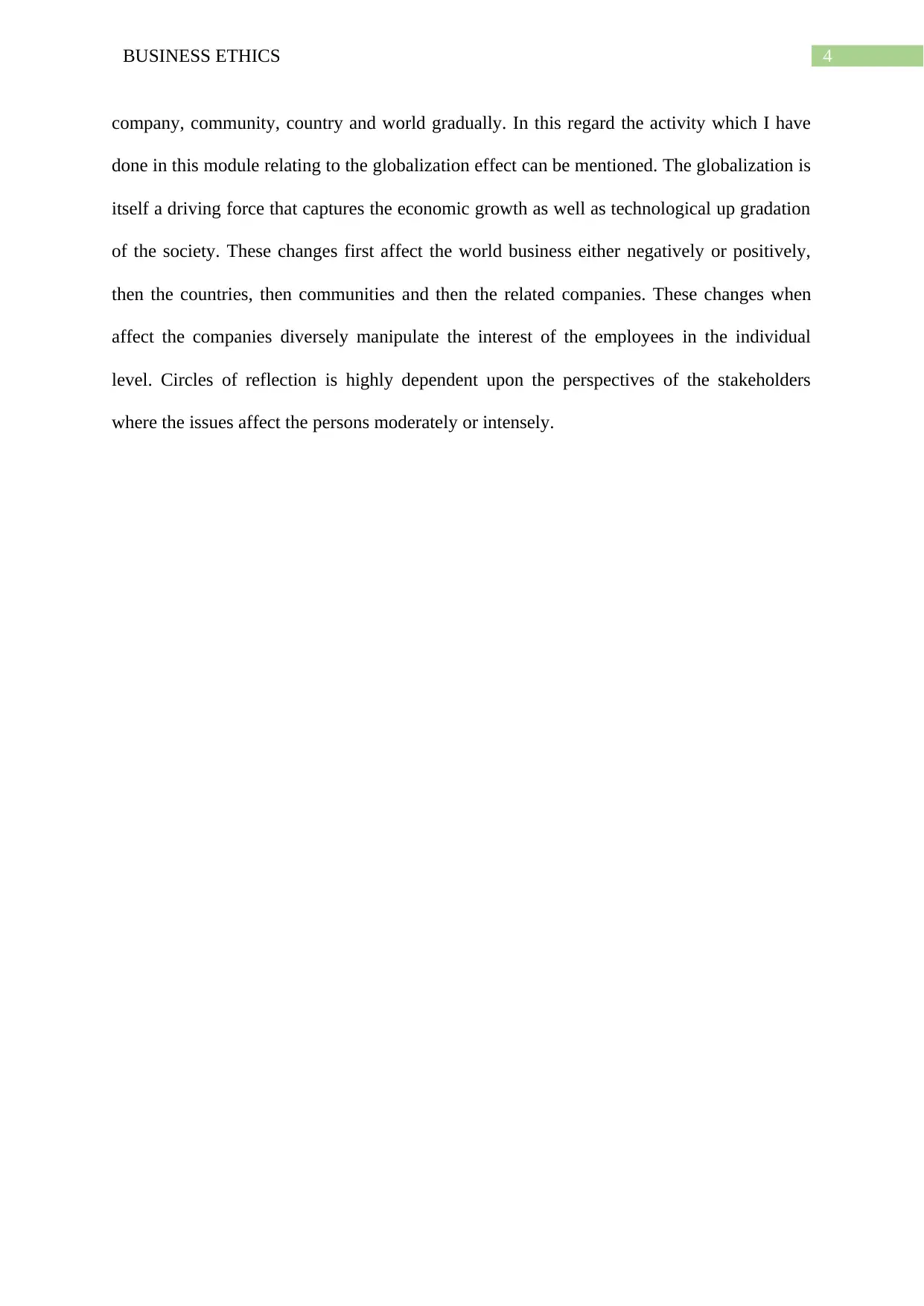
4BUSINESS ETHICS
company, community, country and world gradually. In this regard the activity which I have
done in this module relating to the globalization effect can be mentioned. The globalization is
itself a driving force that captures the economic growth as well as technological up gradation
of the society. These changes first affect the world business either negatively or positively,
then the countries, then communities and then the related companies. These changes when
affect the companies diversely manipulate the interest of the employees in the individual
level. Circles of reflection is highly dependent upon the perspectives of the stakeholders
where the issues affect the persons moderately or intensely.
company, community, country and world gradually. In this regard the activity which I have
done in this module relating to the globalization effect can be mentioned. The globalization is
itself a driving force that captures the economic growth as well as technological up gradation
of the society. These changes first affect the world business either negatively or positively,
then the countries, then communities and then the related companies. These changes when
affect the companies diversely manipulate the interest of the employees in the individual
level. Circles of reflection is highly dependent upon the perspectives of the stakeholders
where the issues affect the persons moderately or intensely.
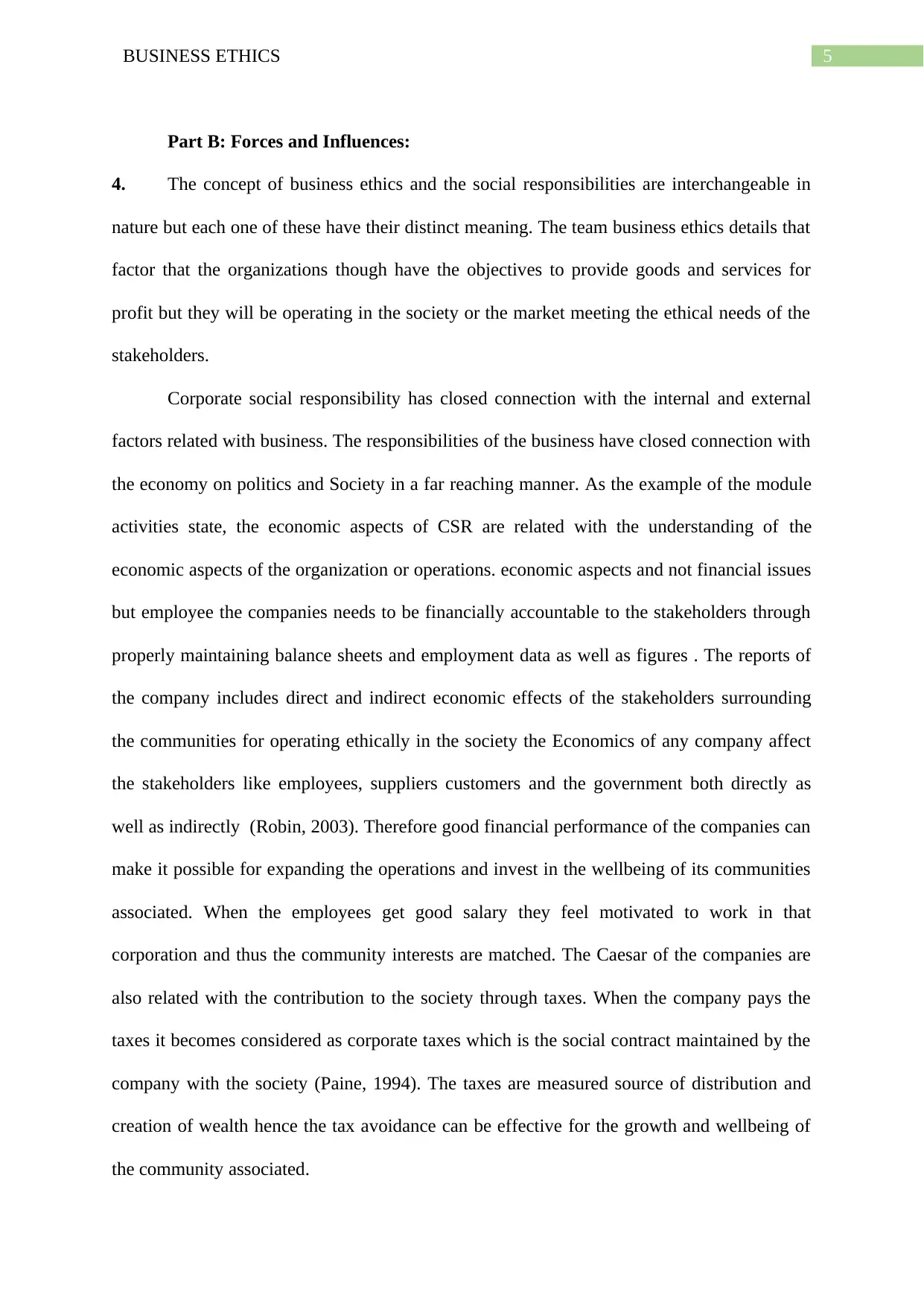
5BUSINESS ETHICS
Part B: Forces and Influences:
4. The concept of business ethics and the social responsibilities are interchangeable in
nature but each one of these have their distinct meaning. The team business ethics details that
factor that the organizations though have the objectives to provide goods and services for
profit but they will be operating in the society or the market meeting the ethical needs of the
stakeholders.
Corporate social responsibility has closed connection with the internal and external
factors related with business. The responsibilities of the business have closed connection with
the economy on politics and Society in a far reaching manner. As the example of the module
activities state, the economic aspects of CSR are related with the understanding of the
economic aspects of the organization or operations. economic aspects and not financial issues
but employee the companies needs to be financially accountable to the stakeholders through
properly maintaining balance sheets and employment data as well as figures . The reports of
the company includes direct and indirect economic effects of the stakeholders surrounding
the communities for operating ethically in the society the Economics of any company affect
the stakeholders like employees, suppliers customers and the government both directly as
well as indirectly (Robin, 2003). Therefore good financial performance of the companies can
make it possible for expanding the operations and invest in the wellbeing of its communities
associated. When the employees get good salary they feel motivated to work in that
corporation and thus the community interests are matched. The Caesar of the companies are
also related with the contribution to the society through taxes. When the company pays the
taxes it becomes considered as corporate taxes which is the social contract maintained by the
company with the society (Paine, 1994). The taxes are measured source of distribution and
creation of wealth hence the tax avoidance can be effective for the growth and wellbeing of
the community associated.
Part B: Forces and Influences:
4. The concept of business ethics and the social responsibilities are interchangeable in
nature but each one of these have their distinct meaning. The team business ethics details that
factor that the organizations though have the objectives to provide goods and services for
profit but they will be operating in the society or the market meeting the ethical needs of the
stakeholders.
Corporate social responsibility has closed connection with the internal and external
factors related with business. The responsibilities of the business have closed connection with
the economy on politics and Society in a far reaching manner. As the example of the module
activities state, the economic aspects of CSR are related with the understanding of the
economic aspects of the organization or operations. economic aspects and not financial issues
but employee the companies needs to be financially accountable to the stakeholders through
properly maintaining balance sheets and employment data as well as figures . The reports of
the company includes direct and indirect economic effects of the stakeholders surrounding
the communities for operating ethically in the society the Economics of any company affect
the stakeholders like employees, suppliers customers and the government both directly as
well as indirectly (Robin, 2003). Therefore good financial performance of the companies can
make it possible for expanding the operations and invest in the wellbeing of its communities
associated. When the employees get good salary they feel motivated to work in that
corporation and thus the community interests are matched. The Caesar of the companies are
also related with the contribution to the society through taxes. When the company pays the
taxes it becomes considered as corporate taxes which is the social contract maintained by the
company with the society (Paine, 1994). The taxes are measured source of distribution and
creation of wealth hence the tax avoidance can be effective for the growth and wellbeing of
the community associated.
⊘ This is a preview!⊘
Do you want full access?
Subscribe today to unlock all pages.

Trusted by 1+ million students worldwide
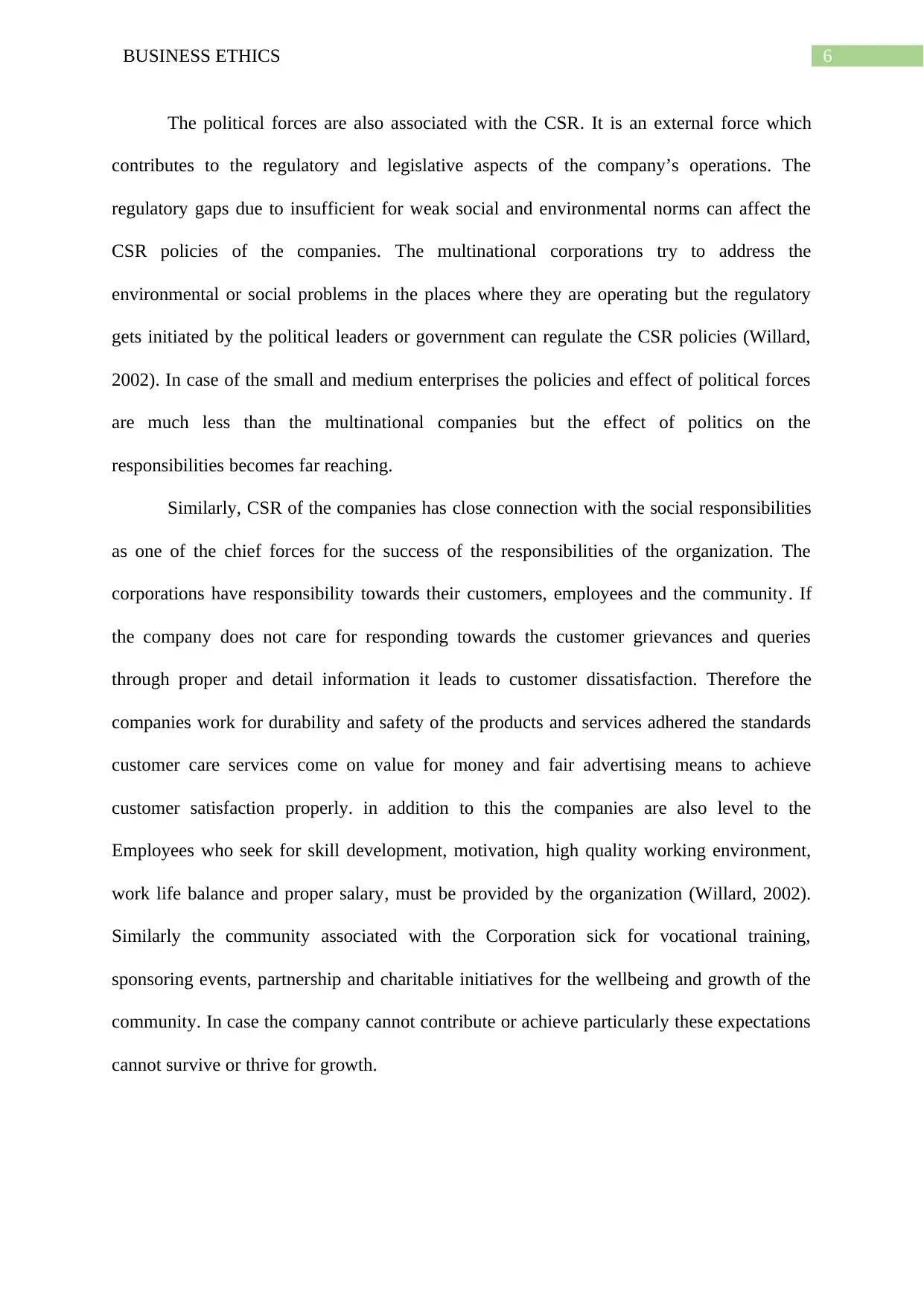
6BUSINESS ETHICS
The political forces are also associated with the CSR. It is an external force which
contributes to the regulatory and legislative aspects of the company’s operations. The
regulatory gaps due to insufficient for weak social and environmental norms can affect the
CSR policies of the companies. The multinational corporations try to address the
environmental or social problems in the places where they are operating but the regulatory
gets initiated by the political leaders or government can regulate the CSR policies (Willard,
2002). In case of the small and medium enterprises the policies and effect of political forces
are much less than the multinational companies but the effect of politics on the
responsibilities becomes far reaching.
Similarly, CSR of the companies has close connection with the social responsibilities
as one of the chief forces for the success of the responsibilities of the organization. The
corporations have responsibility towards their customers, employees and the community. If
the company does not care for responding towards the customer grievances and queries
through proper and detail information it leads to customer dissatisfaction. Therefore the
companies work for durability and safety of the products and services adhered the standards
customer care services come on value for money and fair advertising means to achieve
customer satisfaction properly. in addition to this the companies are also level to the
Employees who seek for skill development, motivation, high quality working environment,
work life balance and proper salary, must be provided by the organization (Willard, 2002).
Similarly the community associated with the Corporation sick for vocational training,
sponsoring events, partnership and charitable initiatives for the wellbeing and growth of the
community. In case the company cannot contribute or achieve particularly these expectations
cannot survive or thrive for growth.
The political forces are also associated with the CSR. It is an external force which
contributes to the regulatory and legislative aspects of the company’s operations. The
regulatory gaps due to insufficient for weak social and environmental norms can affect the
CSR policies of the companies. The multinational corporations try to address the
environmental or social problems in the places where they are operating but the regulatory
gets initiated by the political leaders or government can regulate the CSR policies (Willard,
2002). In case of the small and medium enterprises the policies and effect of political forces
are much less than the multinational companies but the effect of politics on the
responsibilities becomes far reaching.
Similarly, CSR of the companies has close connection with the social responsibilities
as one of the chief forces for the success of the responsibilities of the organization. The
corporations have responsibility towards their customers, employees and the community. If
the company does not care for responding towards the customer grievances and queries
through proper and detail information it leads to customer dissatisfaction. Therefore the
companies work for durability and safety of the products and services adhered the standards
customer care services come on value for money and fair advertising means to achieve
customer satisfaction properly. in addition to this the companies are also level to the
Employees who seek for skill development, motivation, high quality working environment,
work life balance and proper salary, must be provided by the organization (Willard, 2002).
Similarly the community associated with the Corporation sick for vocational training,
sponsoring events, partnership and charitable initiatives for the wellbeing and growth of the
community. In case the company cannot contribute or achieve particularly these expectations
cannot survive or thrive for growth.
Paraphrase This Document
Need a fresh take? Get an instant paraphrase of this document with our AI Paraphraser
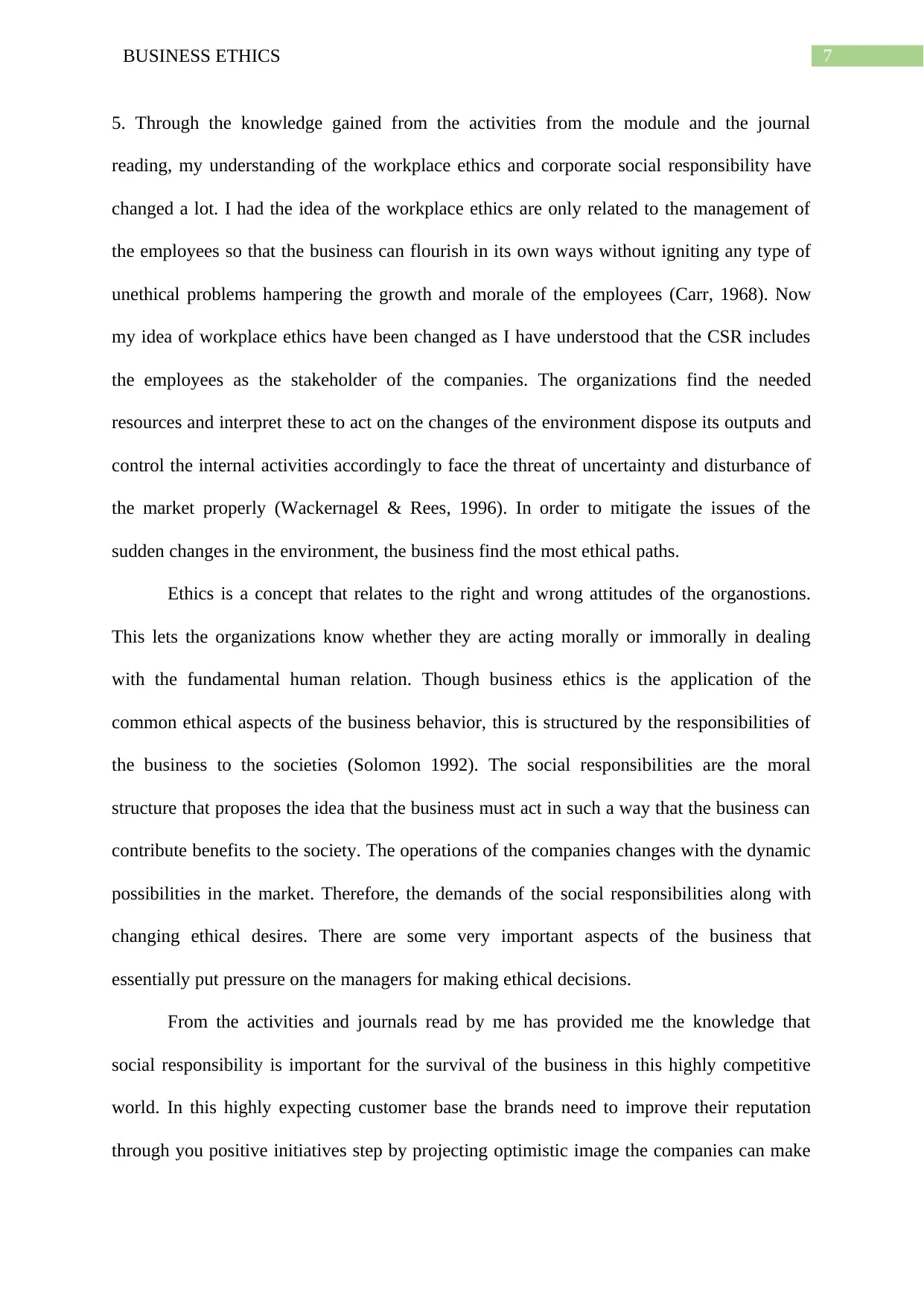
7BUSINESS ETHICS
5. Through the knowledge gained from the activities from the module and the journal
reading, my understanding of the workplace ethics and corporate social responsibility have
changed a lot. I had the idea of the workplace ethics are only related to the management of
the employees so that the business can flourish in its own ways without igniting any type of
unethical problems hampering the growth and morale of the employees (Carr, 1968). Now
my idea of workplace ethics have been changed as I have understood that the CSR includes
the employees as the stakeholder of the companies. The organizations find the needed
resources and interpret these to act on the changes of the environment dispose its outputs and
control the internal activities accordingly to face the threat of uncertainty and disturbance of
the market properly (Wackernagel & Rees, 1996). In order to mitigate the issues of the
sudden changes in the environment, the business find the most ethical paths.
Ethics is a concept that relates to the right and wrong attitudes of the organostions.
This lets the organizations know whether they are acting morally or immorally in dealing
with the fundamental human relation. Though business ethics is the application of the
common ethical aspects of the business behavior, this is structured by the responsibilities of
the business to the societies (Solomon 1992). The social responsibilities are the moral
structure that proposes the idea that the business must act in such a way that the business can
contribute benefits to the society. The operations of the companies changes with the dynamic
possibilities in the market. Therefore, the demands of the social responsibilities along with
changing ethical desires. There are some very important aspects of the business that
essentially put pressure on the managers for making ethical decisions.
From the activities and journals read by me has provided me the knowledge that
social responsibility is important for the survival of the business in this highly competitive
world. In this highly expecting customer base the brands need to improve their reputation
through you positive initiatives step by projecting optimistic image the companies can make
5. Through the knowledge gained from the activities from the module and the journal
reading, my understanding of the workplace ethics and corporate social responsibility have
changed a lot. I had the idea of the workplace ethics are only related to the management of
the employees so that the business can flourish in its own ways without igniting any type of
unethical problems hampering the growth and morale of the employees (Carr, 1968). Now
my idea of workplace ethics have been changed as I have understood that the CSR includes
the employees as the stakeholder of the companies. The organizations find the needed
resources and interpret these to act on the changes of the environment dispose its outputs and
control the internal activities accordingly to face the threat of uncertainty and disturbance of
the market properly (Wackernagel & Rees, 1996). In order to mitigate the issues of the
sudden changes in the environment, the business find the most ethical paths.
Ethics is a concept that relates to the right and wrong attitudes of the organostions.
This lets the organizations know whether they are acting morally or immorally in dealing
with the fundamental human relation. Though business ethics is the application of the
common ethical aspects of the business behavior, this is structured by the responsibilities of
the business to the societies (Solomon 1992). The social responsibilities are the moral
structure that proposes the idea that the business must act in such a way that the business can
contribute benefits to the society. The operations of the companies changes with the dynamic
possibilities in the market. Therefore, the demands of the social responsibilities along with
changing ethical desires. There are some very important aspects of the business that
essentially put pressure on the managers for making ethical decisions.
From the activities and journals read by me has provided me the knowledge that
social responsibility is important for the survival of the business in this highly competitive
world. In this highly expecting customer base the brands need to improve their reputation
through you positive initiatives step by projecting optimistic image the companies can make
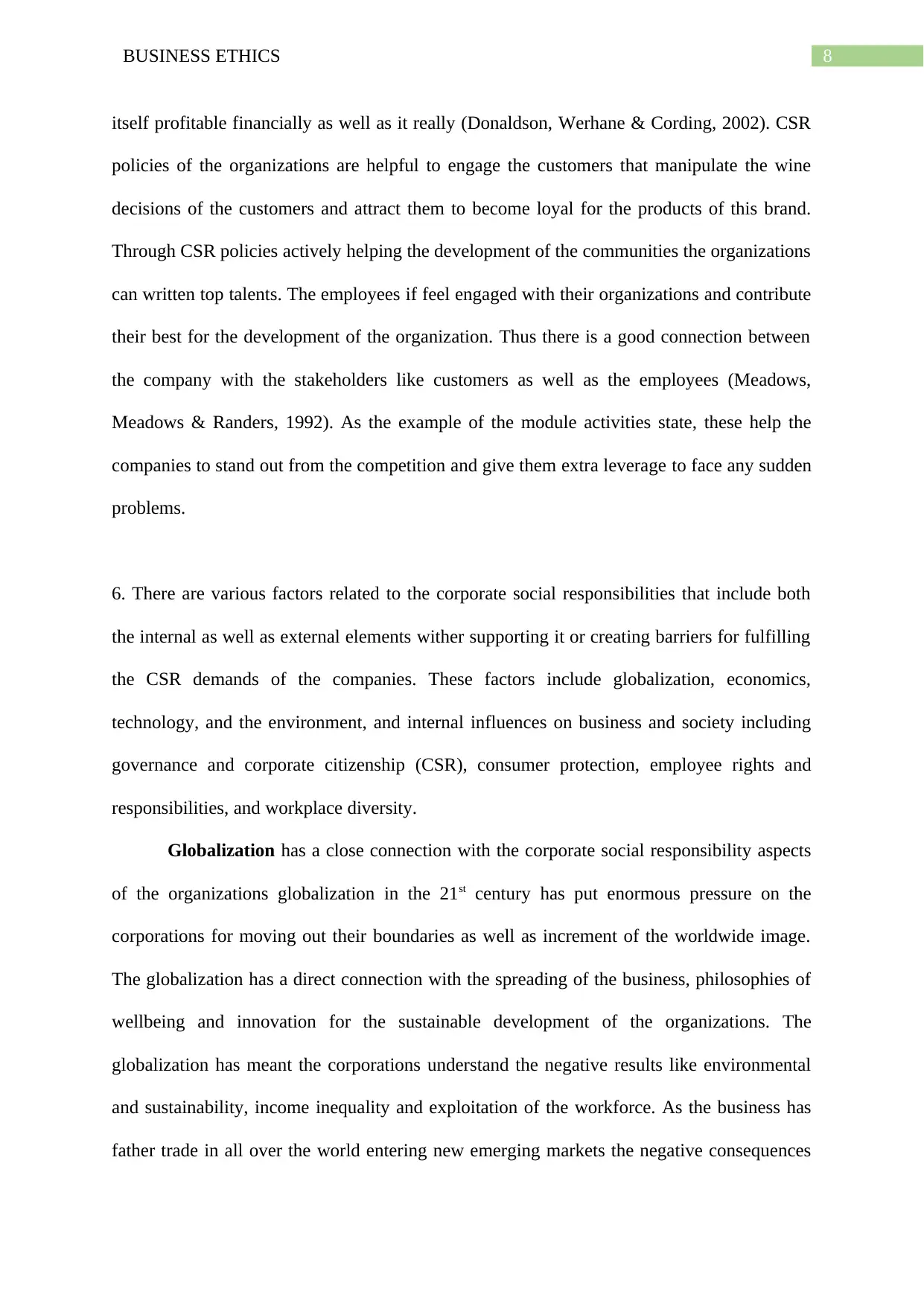
8BUSINESS ETHICS
itself profitable financially as well as it really (Donaldson, Werhane & Cording, 2002). CSR
policies of the organizations are helpful to engage the customers that manipulate the wine
decisions of the customers and attract them to become loyal for the products of this brand.
Through CSR policies actively helping the development of the communities the organizations
can written top talents. The employees if feel engaged with their organizations and contribute
their best for the development of the organization. Thus there is a good connection between
the company with the stakeholders like customers as well as the employees (Meadows,
Meadows & Randers, 1992). As the example of the module activities state, these help the
companies to stand out from the competition and give them extra leverage to face any sudden
problems.
6. There are various factors related to the corporate social responsibilities that include both
the internal as well as external elements wither supporting it or creating barriers for fulfilling
the CSR demands of the companies. These factors include globalization, economics,
technology, and the environment, and internal influences on business and society including
governance and corporate citizenship (CSR), consumer protection, employee rights and
responsibilities, and workplace diversity.
Globalization has a close connection with the corporate social responsibility aspects
of the organizations globalization in the 21st century has put enormous pressure on the
corporations for moving out their boundaries as well as increment of the worldwide image.
The globalization has a direct connection with the spreading of the business, philosophies of
wellbeing and innovation for the sustainable development of the organizations. The
globalization has meant the corporations understand the negative results like environmental
and sustainability, income inequality and exploitation of the workforce. As the business has
father trade in all over the world entering new emerging markets the negative consequences
itself profitable financially as well as it really (Donaldson, Werhane & Cording, 2002). CSR
policies of the organizations are helpful to engage the customers that manipulate the wine
decisions of the customers and attract them to become loyal for the products of this brand.
Through CSR policies actively helping the development of the communities the organizations
can written top talents. The employees if feel engaged with their organizations and contribute
their best for the development of the organization. Thus there is a good connection between
the company with the stakeholders like customers as well as the employees (Meadows,
Meadows & Randers, 1992). As the example of the module activities state, these help the
companies to stand out from the competition and give them extra leverage to face any sudden
problems.
6. There are various factors related to the corporate social responsibilities that include both
the internal as well as external elements wither supporting it or creating barriers for fulfilling
the CSR demands of the companies. These factors include globalization, economics,
technology, and the environment, and internal influences on business and society including
governance and corporate citizenship (CSR), consumer protection, employee rights and
responsibilities, and workplace diversity.
Globalization has a close connection with the corporate social responsibility aspects
of the organizations globalization in the 21st century has put enormous pressure on the
corporations for moving out their boundaries as well as increment of the worldwide image.
The globalization has a direct connection with the spreading of the business, philosophies of
wellbeing and innovation for the sustainable development of the organizations. The
globalization has meant the corporations understand the negative results like environmental
and sustainability, income inequality and exploitation of the workforce. As the business has
father trade in all over the world entering new emerging markets the negative consequences
⊘ This is a preview!⊘
Do you want full access?
Subscribe today to unlock all pages.

Trusted by 1+ million students worldwide
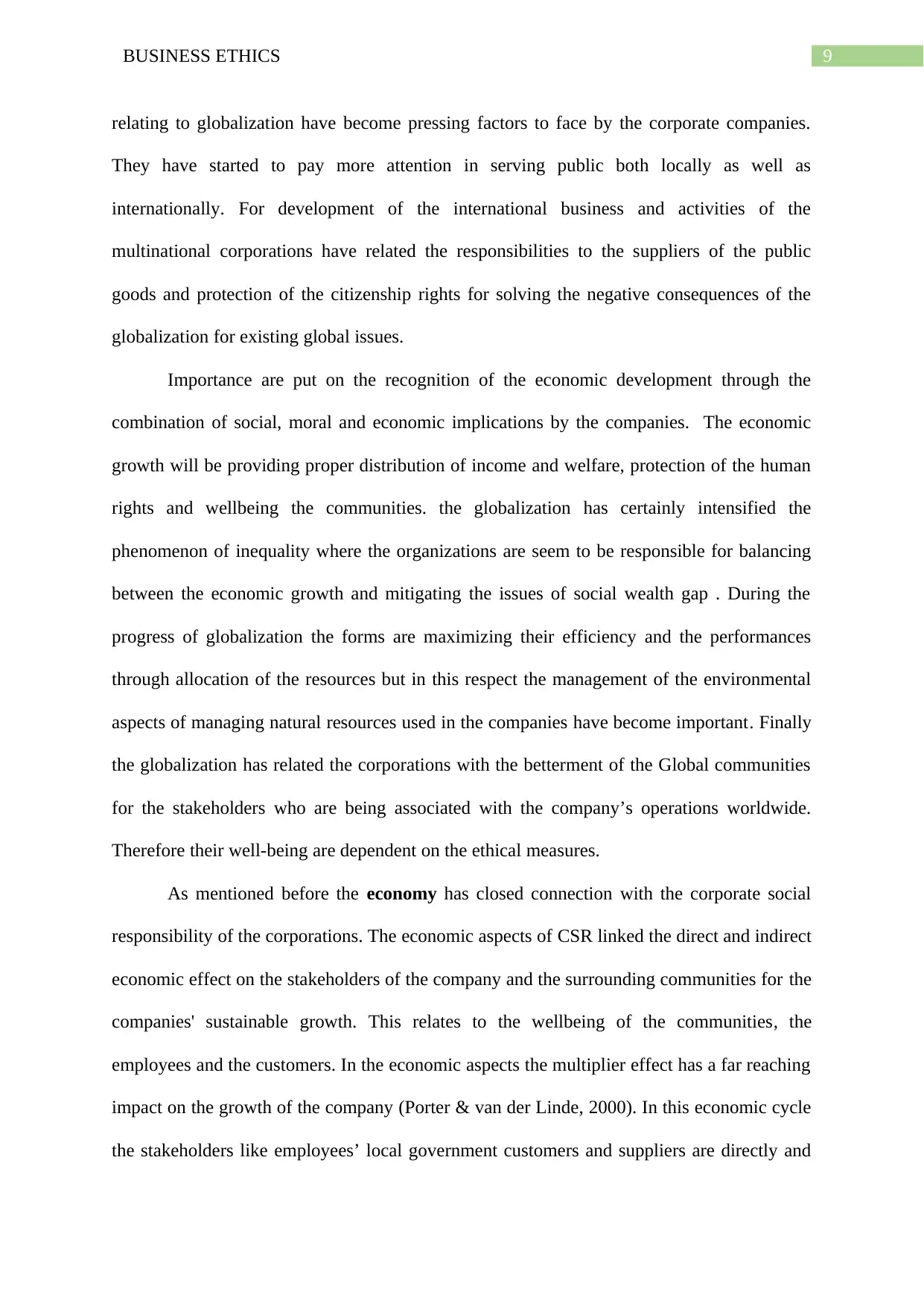
9BUSINESS ETHICS
relating to globalization have become pressing factors to face by the corporate companies.
They have started to pay more attention in serving public both locally as well as
internationally. For development of the international business and activities of the
multinational corporations have related the responsibilities to the suppliers of the public
goods and protection of the citizenship rights for solving the negative consequences of the
globalization for existing global issues.
Importance are put on the recognition of the economic development through the
combination of social, moral and economic implications by the companies. The economic
growth will be providing proper distribution of income and welfare, protection of the human
rights and wellbeing the communities. the globalization has certainly intensified the
phenomenon of inequality where the organizations are seem to be responsible for balancing
between the economic growth and mitigating the issues of social wealth gap . During the
progress of globalization the forms are maximizing their efficiency and the performances
through allocation of the resources but in this respect the management of the environmental
aspects of managing natural resources used in the companies have become important. Finally
the globalization has related the corporations with the betterment of the Global communities
for the stakeholders who are being associated with the company’s operations worldwide.
Therefore their well-being are dependent on the ethical measures.
As mentioned before the economy has closed connection with the corporate social
responsibility of the corporations. The economic aspects of CSR linked the direct and indirect
economic effect on the stakeholders of the company and the surrounding communities for the
companies' sustainable growth. This relates to the wellbeing of the communities, the
employees and the customers. In the economic aspects the multiplier effect has a far reaching
impact on the growth of the company (Porter & van der Linde, 2000). In this economic cycle
the stakeholders like employees’ local government customers and suppliers are directly and
relating to globalization have become pressing factors to face by the corporate companies.
They have started to pay more attention in serving public both locally as well as
internationally. For development of the international business and activities of the
multinational corporations have related the responsibilities to the suppliers of the public
goods and protection of the citizenship rights for solving the negative consequences of the
globalization for existing global issues.
Importance are put on the recognition of the economic development through the
combination of social, moral and economic implications by the companies. The economic
growth will be providing proper distribution of income and welfare, protection of the human
rights and wellbeing the communities. the globalization has certainly intensified the
phenomenon of inequality where the organizations are seem to be responsible for balancing
between the economic growth and mitigating the issues of social wealth gap . During the
progress of globalization the forms are maximizing their efficiency and the performances
through allocation of the resources but in this respect the management of the environmental
aspects of managing natural resources used in the companies have become important. Finally
the globalization has related the corporations with the betterment of the Global communities
for the stakeholders who are being associated with the company’s operations worldwide.
Therefore their well-being are dependent on the ethical measures.
As mentioned before the economy has closed connection with the corporate social
responsibility of the corporations. The economic aspects of CSR linked the direct and indirect
economic effect on the stakeholders of the company and the surrounding communities for the
companies' sustainable growth. This relates to the wellbeing of the communities, the
employees and the customers. In the economic aspects the multiplier effect has a far reaching
impact on the growth of the company (Porter & van der Linde, 2000). In this economic cycle
the stakeholders like employees’ local government customers and suppliers are directly and
Paraphrase This Document
Need a fresh take? Get an instant paraphrase of this document with our AI Paraphraser
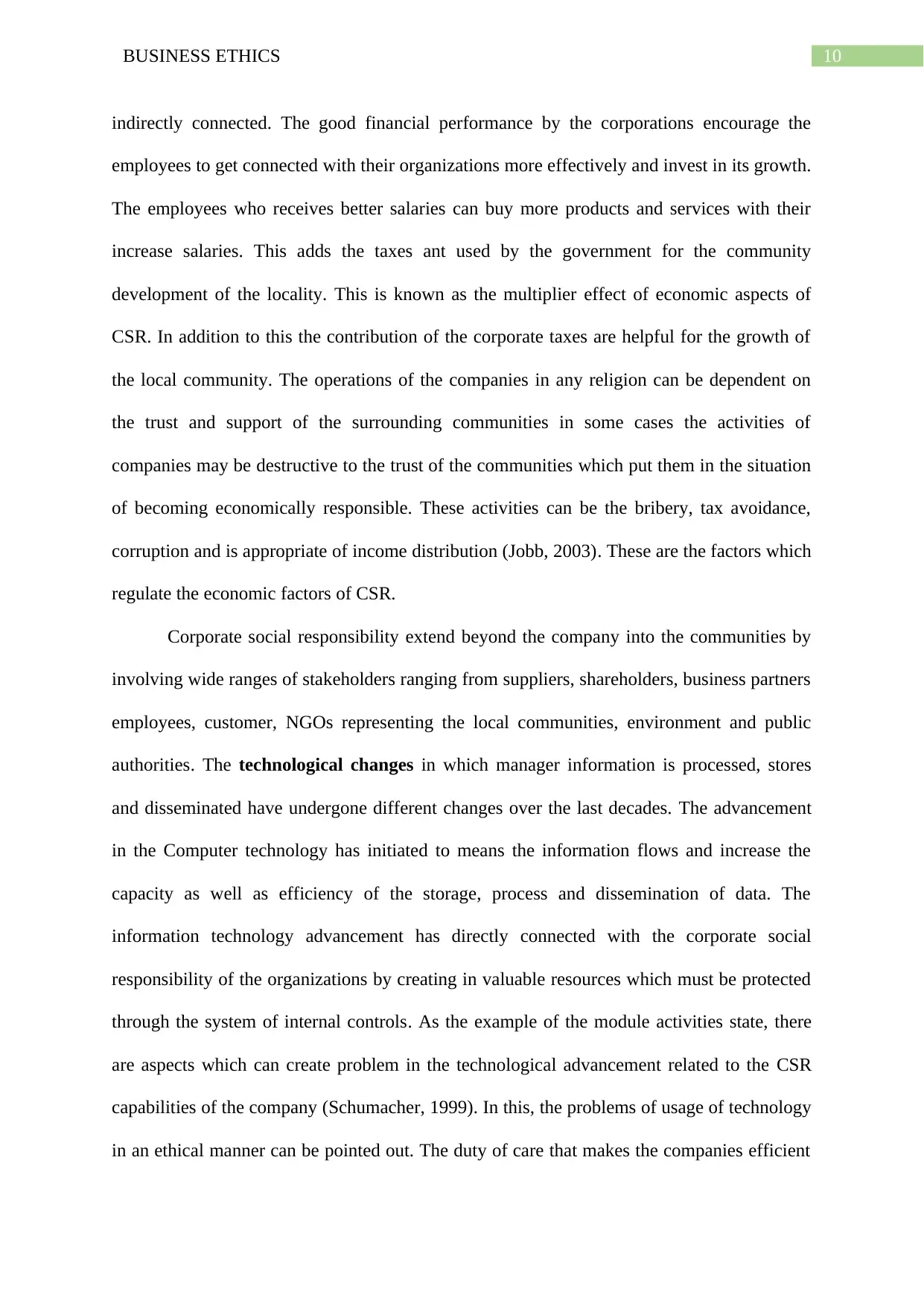
10BUSINESS ETHICS
indirectly connected. The good financial performance by the corporations encourage the
employees to get connected with their organizations more effectively and invest in its growth.
The employees who receives better salaries can buy more products and services with their
increase salaries. This adds the taxes ant used by the government for the community
development of the locality. This is known as the multiplier effect of economic aspects of
CSR. In addition to this the contribution of the corporate taxes are helpful for the growth of
the local community. The operations of the companies in any religion can be dependent on
the trust and support of the surrounding communities in some cases the activities of
companies may be destructive to the trust of the communities which put them in the situation
of becoming economically responsible. These activities can be the bribery, tax avoidance,
corruption and is appropriate of income distribution (Jobb, 2003). These are the factors which
regulate the economic factors of CSR.
Corporate social responsibility extend beyond the company into the communities by
involving wide ranges of stakeholders ranging from suppliers, shareholders, business partners
employees, customer, NGOs representing the local communities, environment and public
authorities. The technological changes in which manager information is processed, stores
and disseminated have undergone different changes over the last decades. The advancement
in the Computer technology has initiated to means the information flows and increase the
capacity as well as efficiency of the storage, process and dissemination of data. The
information technology advancement has directly connected with the corporate social
responsibility of the organizations by creating in valuable resources which must be protected
through the system of internal controls. As the example of the module activities state, there
are aspects which can create problem in the technological advancement related to the CSR
capabilities of the company (Schumacher, 1999). In this, the problems of usage of technology
in an ethical manner can be pointed out. The duty of care that makes the companies efficient
indirectly connected. The good financial performance by the corporations encourage the
employees to get connected with their organizations more effectively and invest in its growth.
The employees who receives better salaries can buy more products and services with their
increase salaries. This adds the taxes ant used by the government for the community
development of the locality. This is known as the multiplier effect of economic aspects of
CSR. In addition to this the contribution of the corporate taxes are helpful for the growth of
the local community. The operations of the companies in any religion can be dependent on
the trust and support of the surrounding communities in some cases the activities of
companies may be destructive to the trust of the communities which put them in the situation
of becoming economically responsible. These activities can be the bribery, tax avoidance,
corruption and is appropriate of income distribution (Jobb, 2003). These are the factors which
regulate the economic factors of CSR.
Corporate social responsibility extend beyond the company into the communities by
involving wide ranges of stakeholders ranging from suppliers, shareholders, business partners
employees, customer, NGOs representing the local communities, environment and public
authorities. The technological changes in which manager information is processed, stores
and disseminated have undergone different changes over the last decades. The advancement
in the Computer technology has initiated to means the information flows and increase the
capacity as well as efficiency of the storage, process and dissemination of data. The
information technology advancement has directly connected with the corporate social
responsibility of the organizations by creating in valuable resources which must be protected
through the system of internal controls. As the example of the module activities state, there
are aspects which can create problem in the technological advancement related to the CSR
capabilities of the company (Schumacher, 1999). In this, the problems of usage of technology
in an ethical manner can be pointed out. The duty of care that makes the companies efficient
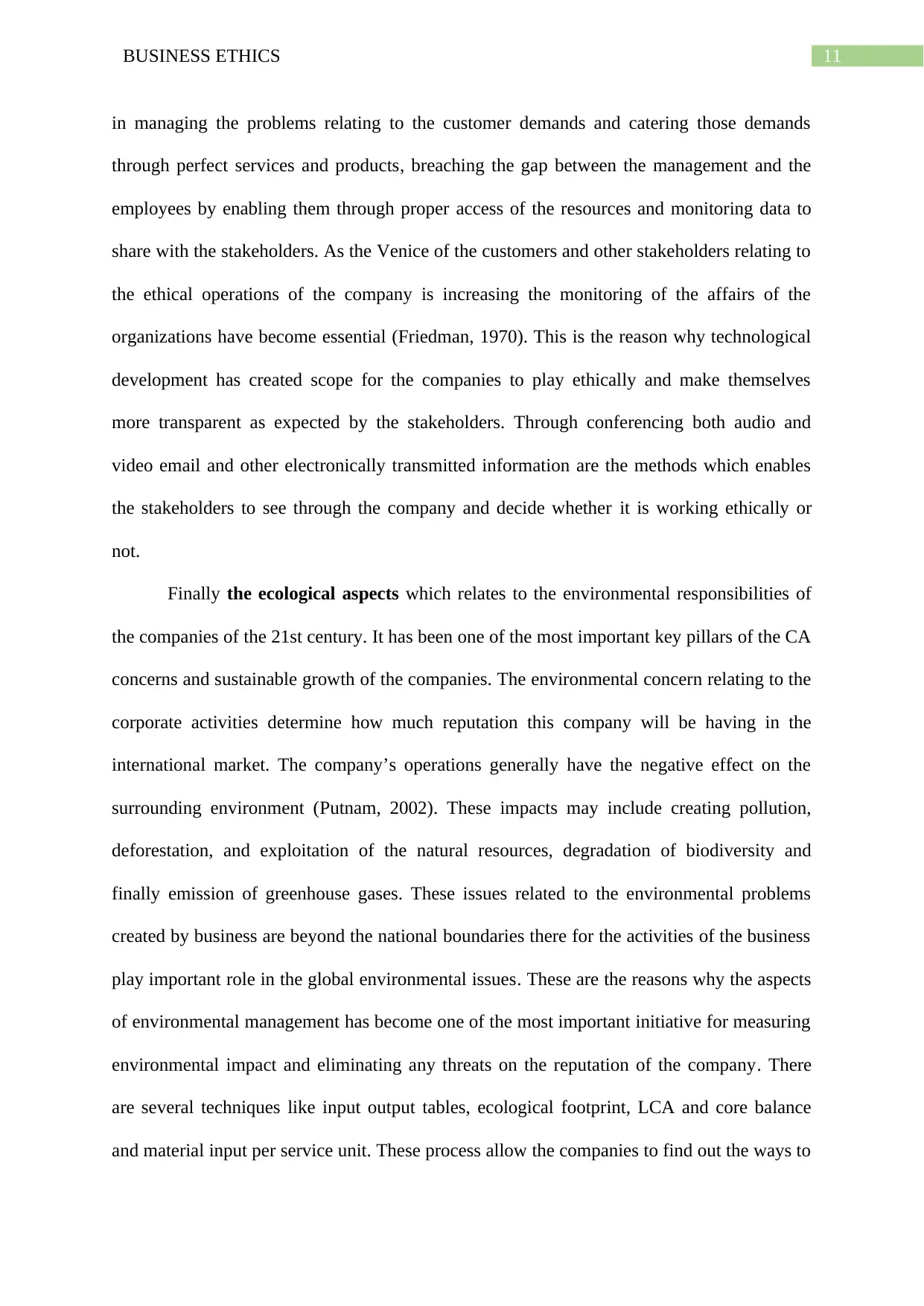
11BUSINESS ETHICS
in managing the problems relating to the customer demands and catering those demands
through perfect services and products, breaching the gap between the management and the
employees by enabling them through proper access of the resources and monitoring data to
share with the stakeholders. As the Venice of the customers and other stakeholders relating to
the ethical operations of the company is increasing the monitoring of the affairs of the
organizations have become essential (Friedman, 1970). This is the reason why technological
development has created scope for the companies to play ethically and make themselves
more transparent as expected by the stakeholders. Through conferencing both audio and
video email and other electronically transmitted information are the methods which enables
the stakeholders to see through the company and decide whether it is working ethically or
not.
Finally the ecological aspects which relates to the environmental responsibilities of
the companies of the 21st century. It has been one of the most important key pillars of the CA
concerns and sustainable growth of the companies. The environmental concern relating to the
corporate activities determine how much reputation this company will be having in the
international market. The company’s operations generally have the negative effect on the
surrounding environment (Putnam, 2002). These impacts may include creating pollution,
deforestation, and exploitation of the natural resources, degradation of biodiversity and
finally emission of greenhouse gases. These issues related to the environmental problems
created by business are beyond the national boundaries there for the activities of the business
play important role in the global environmental issues. These are the reasons why the aspects
of environmental management has become one of the most important initiative for measuring
environmental impact and eliminating any threats on the reputation of the company. There
are several techniques like input output tables, ecological footprint, LCA and core balance
and material input per service unit. These process allow the companies to find out the ways to
in managing the problems relating to the customer demands and catering those demands
through perfect services and products, breaching the gap between the management and the
employees by enabling them through proper access of the resources and monitoring data to
share with the stakeholders. As the Venice of the customers and other stakeholders relating to
the ethical operations of the company is increasing the monitoring of the affairs of the
organizations have become essential (Friedman, 1970). This is the reason why technological
development has created scope for the companies to play ethically and make themselves
more transparent as expected by the stakeholders. Through conferencing both audio and
video email and other electronically transmitted information are the methods which enables
the stakeholders to see through the company and decide whether it is working ethically or
not.
Finally the ecological aspects which relates to the environmental responsibilities of
the companies of the 21st century. It has been one of the most important key pillars of the CA
concerns and sustainable growth of the companies. The environmental concern relating to the
corporate activities determine how much reputation this company will be having in the
international market. The company’s operations generally have the negative effect on the
surrounding environment (Putnam, 2002). These impacts may include creating pollution,
deforestation, and exploitation of the natural resources, degradation of biodiversity and
finally emission of greenhouse gases. These issues related to the environmental problems
created by business are beyond the national boundaries there for the activities of the business
play important role in the global environmental issues. These are the reasons why the aspects
of environmental management has become one of the most important initiative for measuring
environmental impact and eliminating any threats on the reputation of the company. There
are several techniques like input output tables, ecological footprint, LCA and core balance
and material input per service unit. These process allow the companies to find out the ways to
⊘ This is a preview!⊘
Do you want full access?
Subscribe today to unlock all pages.

Trusted by 1+ million students worldwide
1 out of 20
Related Documents
Your All-in-One AI-Powered Toolkit for Academic Success.
+13062052269
info@desklib.com
Available 24*7 on WhatsApp / Email
![[object Object]](/_next/static/media/star-bottom.7253800d.svg)
Unlock your academic potential
Copyright © 2020–2025 A2Z Services. All Rights Reserved. Developed and managed by ZUCOL.




